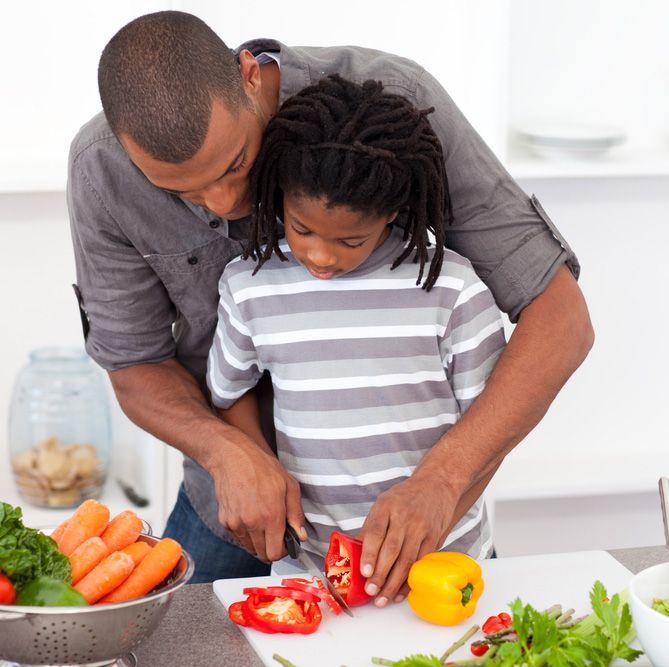Conscientious parents are always on the lookout for ways to better teach, communicate, and connect with their children. Parents of younger children are seeking ways to promote academic as well as social learning. Parents of teenagers strive to keep healthy channels of communication open while instilling values intrinsic to their family traditions. The family kitchen is the epicenter of these noble ambitions! Cooking with your kids, both young and old, has wonderful benefits.
It's true that including the kids in cooking meals requires time, patience, (especially after a harried work day) and some extra cleanup. Is the effort worth it? Child and family experts across many educational disciplines say, “Yes”. They believe the time invested is well worth the effort and that parents and children will reap both short and long term benefits.
Why cooking is important for Children
Recent studies indicate that nutritional knowledge alone is insufficient to educate children about the importance of healthy eating. Studies show that children studying nutrition with food preparation in science class is more effective than classes without. The tactile experiential learning or hands-on activities involving the handling of food and equipment during mealtime food preparation is paramount in providing children a thorough learning experience. Children learn by touching, tasting, seeing, feeling, and listening. During cooking, all of the senses are engaged. This multisensory engagement is what makes experiences memorable. (How many of our fond memories are tied to the smell of freshly baked bread or that one dish that only grandma could make?)
Health-Nutritional Benefits
Cooking together provides a relaxed way to discuss nutrition. Working side-by-side in the kitchen affords the perfect opportunity for discussions about food choices and the impact those choices have on the body and the environment. Experts say the single best thing we can do for our family’s health is to cook at home. The preparation of broiled fish provides the opportunity to speak of the importance of fatty acids. Variation and color on the plate gives way to conversations about the importance of “eating the rainbow” and why it is good for our health. The more educated children are about food, the more likely they will appreciate your suggestions to eat something healthy.
Children are more likely to eat what they make. The mealtime battles regarding the willingness to try new and healthy foods may well become a thing of the past. Research published in the Journal of the Academy of Nutrition and Dietetics indicates that children engaged in tactile experiences, such as handling foods, have less food neophobia (food fear) and greater acceptance of eating a variety of foods. When kids help in the kitchen, cooking creates a sense of ownership that shifts their perception and relationship with food. Studies also have found that children participating in culinary classes eat more fruits and vegetables upon completing the course. So, children who cook become children who taste and often times eat!
Children develop a mature palate. Exposure to scratch cooking at home helps kids develop a taste for fresh, healthy ingredients. The earlier a child is exposed and becomes accustomed to wholesome ingredients, the less likely they will acquire a taste for calorie-laden and nutritionally-void processed foods. They will begin to skip less healthy processed snack food as they learn to prepare their own food.
Children become informed consumers. Teaching children to cook not only educates them about nutrition, it also teaches them to make smarter food choices and take greater care in planning their meals. Meals prepared from scratch usually contain more nutrients, fewer calories, chemicals and sweeteners than pre-packaged foods and restaurant meals (and are cheaper to prepare). Children who have made bread realize that good bread doesn’t need sugar. They will recognize that a list of ingredients a mile long (and are hard to pronounce) have no business being consumed. You may find they even begin to police your shopping! As children experience fresh ingredients and become aware of the cost of food, they will begin to scrutinize their food choices outside the home more carefully.
Social-Emotional Benefits
Preparing meals together means quality time as a family. Time spent cooking with children when they are young offers a relaxed opportunity to communicate. It is an investment that will pay off as children grow; time chatting and cooking in the kitchen together becomes even more important as they reach the adolescent and teenage years. Communication doesn’t start when a child reaches 17. Family habits established during the early years will carry through to the young adult years. A healthy love of cooking and experience in the kitchen is an essential life skill that will lead to success when children move from home, live independently, or find themselves in relationships with shared responsibilities.
Spending time in the kitchen gives children confidence. Children who cook at home feel a sense of accomplishment. There is nothing that evokes a warm response like the expression of a child proudly serving their food to friends and family!
Kids thrive on feeling accomplished and cooking is a perfect conduit. Cooking is an ideal way to boost self-worth and teach responsibility. The feeling of contributing to the well being of their family is a great source of pride for children and teenagers. Parents get many opportunities to bond with children through parental praise, acceptance, and the show of support—all of which are associated with lowering the likelihood of high risks behaviors.
What Else do Children Learn from Cooking?
A kitchen is literally learning lab. Cooking can be looked upon as science experiences that children can eat. When cooking, children observe changes in food ingredients. They learn about actions and consequences. They learn about temperature, floating, melting, freezing and (sometimes) burning. They learn and practice math skills through fractions, measuring, doubling recipes and contemplating quantities. Following recipes encourages self-direction and independence. It also promotes problem solving and creativity. In terms of physical development, cooking and food preparation also contributes toward small muscle control and eye-hand coordination.
Science, counting, fractions, weighing, sequencing, measuring, language, fine motor skills, reading, problem solving, and social engagement are all being practiced during those magical moments in the kitchen.
Lastly, cultivating a welcoming and open-minded approach to food can also translate to adults who approach life, new tastes, attitudes, and most importantly, other cultures in the same manner—it is an attitude that can carry children beyond the family kitchen while also teaching them to respect their family traditions and heritage.
How to Start Cooking with Your Kids
Pressed for time in the morning? Start cooking breakfast with your kids on the weekends, during the summer months, or on school holidays (It is the thing that family traditions are made of!)
Eat dinner together regularly. Kids are more likely to sit down to a meal that they have helped prepare. This can go a long way towards family time during an era of excessive outside demands on tween and teenage schedules. Involving your kids in the kitchen is a big stepping-stone towards getting them to appreciate family meals. Family meals can be a struggle and many families work hard to even have one daily meal together. Again, start by maximizing weekend opportunities for family time to eat together.
Involve children in meal planning and shopping. Knowing that Tuesdays are “Dad’s Famous Taco Day” or that Thursdays are “Chef’s Choice” will get children excited about dinner time and food preparation. Allowing children to be involved with food shopping is also a way to encourage participation when back at home.
Cooking with kids can be the gift that keeps on giving. It inspires in them what we as adults know—food nourishes our bodies, provides comfort, and symbolizes love and security. What greater gift can parents give to their children as they step into their place in the world?


